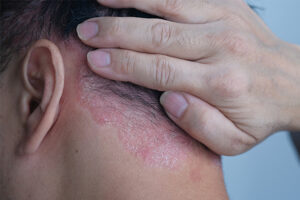Dermatology
Plaque Psoriasis
Screening Patients With Plaque Psoriasis for Biologic Treatment
In the right patients, biologic therapies can have a high benefit to risk ratio and are an important addition to the psoriasis treatment armamentarium. However, proper screening is crucial for selecting those patients who may benefit from these agents. Researchers at the Maui Derm Hawaii 2024 meeting presented data from several studies that provide additional information to help providers in their clinical decision making.
Following these presentations, featured expert Steven R. Feldman, MD, PhD, was interviewed by Conference Reporter Medical Writer Rick Davis. Dr Feldman’s clinical perspectives on this topic are presented here.
When I first became a psoriasis specialist, I needed a simple system to help me determine the severity of a patient’s disease and select appropriate treatment. I typically treated patients who had mild psoriasis with topicals and those who had extensive disease with phototherapy or systemic therapy, so that we were treating the whole body at once. Today, the first things that I think of when considering patients for biologic therapy are still whether their level of disease warrants systemic therapy and whether they have more than we can treat with topicals alone.
If a patient has relatively mild psoriasis with limited disease that would respond to topicals, but they also have arthritis, a lot of dermatologists might decide to switch to a biologic. Personally, if a patient has limited psoriasis, along with symptoms of arthritis, I still give them topicals for their skin, and I also refer them to a rheumatologist for evaluation and management of their joints. Patients with arthritis and mild psoriasis do not necessarily need biologic treatment just because they are experiencing joint pain. A rheumatologist might simply recommend an NSAID for their joints.
Once I have made the determination that a patient has extensive disease requiring systemic therapy, I then begin the process of choosing a biologic therapy for that patient. We previously would start patients with methotrexate, and insurers might still prefer that we use methotrexate first because it is less expensive. However, I want to give my patients the best possible care, and I think that biologics are more effective and safer than methotrexate. Therefore, I prefer biologics as a first-line approach for patients with extensive disease requiring systemic therapy.
At Maui Derm Hawaii 2024, Amin et al presented a poster on the efficacy and safety of the biologic risankizumab in diverse racial and ethnic populations with moderate to severe psoriasis. Efficacy was similar across race and ethnicity, and no new safety signals were detected. Three posters were presented from the ongoing VISIBLE study of guselkumab across patients of all skin tones. What stood out to me in these studies was that the percentage of patients with moderate to severe scalp psoriasis who had been on biologic therapy in the past was lower than what we usually see in our studies nowadays. This lower rate of previous treatment with biologics makes me wonder if patients of color are not being treated with biologics at the same rate that other patients are being treated. If this is the case, it may be because they do not have access to dermatologists, because they are reluctant to start biologics for one reason or another, or due to insurance access issues. I think that this was one of the more interesting findings from the VISIBLE study.
Another poster presented at Maui Derm Hawaii 2024 from Lebwohl and colleagues looked at the real-world effectiveness of ixekizumab after switching from IL-23 inhibitors and other biologic therapies. If a patient does well on a treatment but then that treatment loses efficacy, I think that there is a very good chance that the patient has developed an antibody against the drug. Since antidrug antibodies are specific to specific drugs, other drugs that block that particular pathway are not likely to be affected. If a patient in my practice was on an IL-17 drug and did well on it, but then eventually it stopped working, I would be quick to switch them to a different IL-17 blocker. On the other hand, if I started a patient on a drug from 1 class and it never worked at all, while that could be due to antibodies, it seems more likely that it would be due to the mechanism of action. It simply may not be the best mechanism for that patient. In that case, I would generally switch the patient to a biologic with a different mechanism of action.
If a patient fails multiple biologics, either quickly or slowly, then I might switch them from an injectable biologic to an oral agent because I would fear that they might be somebody who develops antibodies very easily. Alternatively, I may switch them to a physician-administered treatment if I suspect that the reason they are losing efficacy is perhaps because they do not handle or administer the drug properly. Biologics need to be properly refrigerated, not frozen, and not exposed to multiple warming and cooling cycles. These are important considerations for patients who fail or are unable to follow the handling and/or administration instructions for biologics.
Alexis A, McMichael A, Bhutani T, et al. VISIBLE Cohort B: guselkumab demonstrates significant scalp clearance at week 16 in participants with moderate-to-severe scalp psoriasis across all skin tones. Poster presented at: Maui Derm Hawaii 2024; January 22-26, 2024; Wailea, HI.
Amin A, Alexis A, Gooderham M, et al. Efficacy and safety of risankizumab in diverse racial and ethnic patient populations with moderate-to-severe psoriasis. Poster presented at: Maui Derm Hawaii 2024; January 22-26, 2024; Wailea, HI.
Elmets CA, Korman NJ, Prater EF, et al. Joint AAD-NPF guidelines of care for the management and treatment of psoriasis with topical therapy and alternative medicine modalities for psoriasis severity measures. J Am Acad Dermatol. 2021;84(2):432-470. doi:10.1016/j.jaad.2020.07.087
Lebwohl M, Strober B, Schrader A, et al. 6-month real world study to assess the effectiveness of ixekizumab after switching from IL-23 inhibitors and other biologic therapies: the CorEvitas Psoriasis Registry. Poster presented at: Maui Derm Hawaii 2024; January 22-26, 2024; Wailea, HI.
Menter A, Gelfand JM, Connor C, et al. Joint American Academy of Dermatology-National Psoriasis Foundation guidelines of care for the management of psoriasis with systemic nonbiologic therapies. J Am Acad Dermatol. 2020;82(6):1445-1486. doi:10.1016/j.jaad.2020.02.044
Menter A, Strober BE, Kaplan DH, et al. Joint AAD-NPF guidelines of care for the management and treatment of psoriasis with biologics. J Am Acad Dermatol. 2019;80(4):1029-1072. doi:10.1016/j.jaad.2018.11.057
Stein Gold L, Soung J, Heath CR, et al. VISIBLE Cohort B: guselkumab improves key health-related quality of life measures at week 16 in participants with moderate-to-severe scalp psoriasis across all skin tones. Poster presented at: Maui Derm Hawaii 2024; January 22-26, 2024; Wailea, HI.
Yeung J, Vashi N, Shahriari M, et al. VISIBLE Cohort B: guselkumab improves patient-reported impact of skin discoloration at week 16 in participants with moderate-to-severe scalp psoriasis across all skin tones. Poster presented at: Maui Derm Hawaii 2024; January 22-26, 2024; Wailea, HI.
This information is brought to you by Engage Health Media and is not sponsored, endorsed, or accredited by Maui Derm Hawaii 2024.











